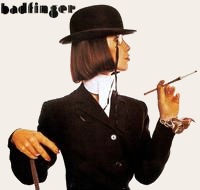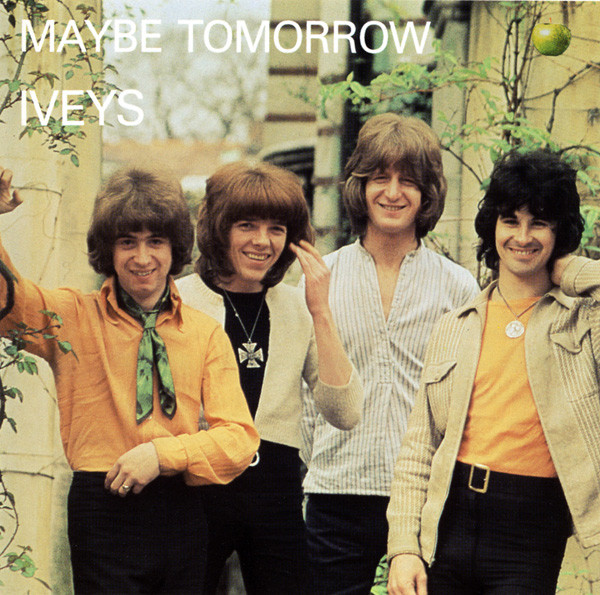 Way back in 1974, they had just completed their excellent Wish You Were Here album, but Badfinger was so burnt out that Pete Ham tried to quit. Threatened with further financial ruin, he was persuaded to stay on for the promotional tour, for which they’d already recruited one Bob Jackson to fill in on keyboards and guitar. Their contract required them to put out yet another album post-haste, so they went back to Apple Studios with Kiss producers Kenny Kerner and Richie Wise, but without Joey Molland, who wasn’t considered as important as Pete to the powers that be to keep him from quitting. They were given exactly two weeks to record the basic tracks.
Way back in 1974, they had just completed their excellent Wish You Were Here album, but Badfinger was so burnt out that Pete Ham tried to quit. Threatened with further financial ruin, he was persuaded to stay on for the promotional tour, for which they’d already recruited one Bob Jackson to fill in on keyboards and guitar. Their contract required them to put out yet another album post-haste, so they went back to Apple Studios with Kiss producers Kenny Kerner and Richie Wise, but without Joey Molland, who wasn’t considered as important as Pete to the powers that be to keep him from quitting. They were given exactly two weeks to record the basic tracks. What was soon dubbed Head First by Tom Evans (as that’s how he saw the band going into the proverbial lion’s mouth) was given a few perfunctory mixes to please the label. But as litigation had already started against the band due to their manager’s criminal activity, the album was effectively dead in the water. To make matters worse, Wish You Were Here was pulled from shelves until everything could be sorted. Mere months later, Pete was dead.
The first mixed sequence of the album shows potential, if well short of genius. “Lay Me Down” is an obvious attempt to write a catchy hit single with a hook, which Pete could easily do, and which he’d done better. Jackson’s “Turn Around” is even heavier rock than Joey used to play, but his lead vocal just doesn’t sound right in this band. Pete comes back strong with “Keep Believing”, one of those pep talks that could also apply to himself, even as it resembles “Apple Of My Eye”. Mike Gibbins stays in a backwoods mode with “Rockin’ Machine”, a very brief statement at just under 90 seconds, then Tom Evans comes in brooding with “Passed Fast”, a bleak slab of rock written and sung with Jackson.
“Saville Row” is an unfinished instrumental, heavy on the type of electronic keyboards that Pete was not known for using, and fades after about a minute. It does work as a prelude to “Moonshine”, a pleasant collaboration between Tom, Mike, and Jackson, with nice layered harmonies and sweet lead guitar. Tom’s real feelings are made clear in the bitter “Rock ‘N’ Roll Contract” and “Hey Mr. Manager”; in between, Mike’s “Back Again” nicely balances acoustic strumming with synth string touches.
Besides being short, Head First is not a happy album; the pressure of having to create material at such a rate had clearly taken its toll, and there’s no way to know whether it would have made any impact on any charts. So there it sat, until four of the songs (Pete’s two gems, plus “Moonshine” and “Passed Fast”) were included on Rhino’s The Best Of Badfinger Volume II some 15 years after the fact.
Once things got more straightened out at the end of the century, Badfinger biographer and champion Dan Matovina was able to arrange the first full release of the album. As the master tapes were missing, one of the rough mixes was used, but despite opening with “Lay Me Down”, the rest of the songs were shuffled for “listenability” purposes. “Saville Row” still led into “Moonshine”, but was cut down to 36 seconds for no stated reason, and ending the album with “Rockin’ Machine” makes it seem like an afterthought. To draw people in, a bonus, even shorter disc contained acoustic demos of unreleased songs, mostly with somber lyrical content: six from Pete (including “Lay Me Down”), three from Mike, and one each from Jackson and Tom.
The original multitracks were finally discovered in time for the album’s 50th anniversary, or at least the anniversary of its recording, so Bob Jackson was able to get it back in circulation again. This freshly mixed version had no extras, but rejigged the order (past “Lay Me Down”) yet again, moving an artificially extended and retitled “Savile Row (2024)” to the end of the program.
As an epilogue to the whole sad saga, Head First is a letdown. But we always like hearing Pete Ham’s music, so it’s good to have. Meanwhile, several CDs worth of his demos are streaming officially, so that will also help keep his memory alive.
Badfinger Head First (2000)—3
2025 50th Anniversary Special Edition: “same” as 2000, minus 11 extra tracks





.jpg)